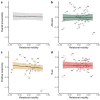Partner choice does not predict prosociality across countries
- PMID: 37588938
- PMCID: PMC10426035
- DOI: 10.1017/ehs.2022.51
Partner choice does not predict prosociality across countries
Abstract
Why does human prosociality vary around the world? Evolutionary models and laboratory experiments suggest that possibilities for partner choice (i.e. the ability to leave unprofitable relationships and strike up new ones) should promote cooperation across human societies. Leveraging the Global Preferences Survey (n = 27,125; 27 countries) and the World Values Survey (n = 54,728; 32 countries), we test this theory by estimating the associations between relational mobility, a socioecological measure of partner choice, and a wide variety of prosocial attitudes and behaviours, including impersonal altruism, reciprocity, trust, collective action and moral judgements of antisocial behaviour. Contrary to our pre-registered predictions, we found little evidence that partner choice is related to prosociality across countries. After controlling for shared causes of relational mobility and prosociality - environmental harshness, subsistence style and geographic and linguistic proximity - we found that only altruism and trust in people from another religion are positively related to relational mobility. We did not find positive relationships between relational mobility and reciprocity, generalised trust, collective action or moral judgements. These findings challenge evolutionary theories of human cooperation which emphasise partner choice as a key explanatory mechanism, and highlight the need to generalise models and experiments to global samples.
Keywords: cooperation; cross-cultural; partner choice; prosociality; relational mobility.
© The Author(s) 2022.
Conflict of interest statement
The authors declare no conflicts of interest.
Figures








References
-
- Aust, F., & Barth, M. (2020). papaja: Prepare reproducible APA journal articles with R Markdown. https://github.com/crsh/papaja
-
- Barclay, P. (2004). Trustworthiness and competitive altruism can also solve the ‘tragedy of the commons’. Evolution and Human Behavior, 25(4), 209–220. 10.1016/j.evolhumbehav.2004.04.002 - DOI
LinkOut - more resources
Full Text Sources
